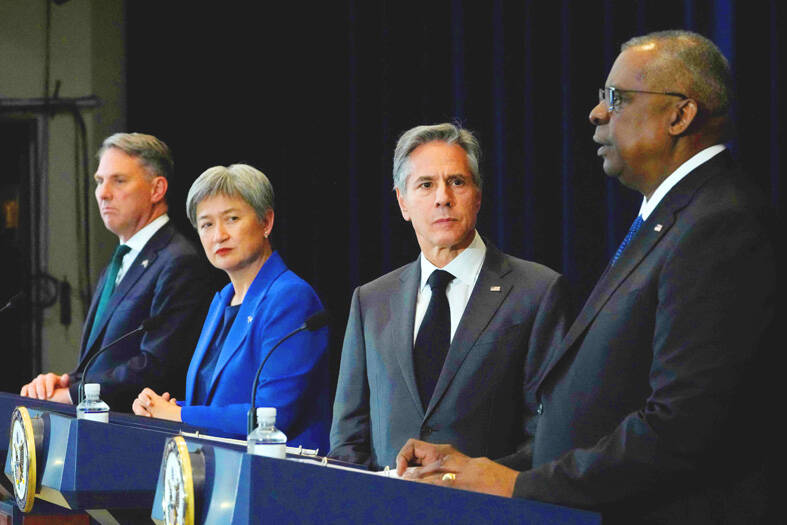The US and Australia on Tuesday expressed strong opposition to China’s “destabilizing” actions in the Indo-Pacific region, and support for upholding peace and stability across the Taiwan Strait.
In a statement after the annual Australia-US Ministerial Consultations in Washington, the two countries described Taiwan as a leading democracy in the region, an important regional economy and a key contributor to critical supply chains.
They reaffirmed their commitment to maintaining peace and stability across the Taiwan Strait, and opposed any unilateral changes to the “status quo,” the statement said.

Photo: AFP
They also committed to working together to support Taiwan’s meaningful participation in international organizations and enhancing economic, social and people-to-people ties with Taiwan, while also continuing to coordinate efforts on development in the Pacific with Taiwan, it said.
The annual event is known as the 2+2 talks because they involve the defense and foreign ministers of each country.
They were attended by US Secretary of State Antony Blinken and US Secretary of Defense Lloyd Austin, and Australian Minister for Foreign Affairs Penny Wong (黃英賢) and Australian Minister for Defence Richard Marles.
Aside from voicing support for Taiwan, they expressed strong opposition to China’s destabilizing actions in the South China Sea, such as the militarization of disputed features, and dangerous encounters at sea and in the air.
They also expressed concern about other actions by Beijing, including the assertion of excessive maritime claims that are inconsistent with international law, and pledged to work with others to support regional maritime security and uphold international law, the statement said.
They also said they would welcome Japanese troops into three-way rotations, vowing a united front in the face of China’s rapid military advances.
“It’s really important that we are doing this from the point of view of providing balance within our region and involving other countries within our region, and we look forward to being able to have more engagement with Japan,” Marles told a news conference.
“We can go to Japan at the end of this week with an invitation for Japan to be participating in more exercises with Australia and the United States,” Marles added.
Austin said that the allies would seek Japanese participation in joint operations in Australia, where the US has been rotating marines since 2011 through Darwin.
Austin said that the US and Australia agreed to increase rotations of bomber task forces, fighter jets, and the US Army and Navy.
“We agreed to enhance trilateral defense cooperation and to invite Japan to integrate into our force posture initiatives in Australia,” Austin said.

NATIONAL SECURITY THREAT: An official said that Guan Guan’s comments had gone beyond the threshold of free speech, as she advocated for the destruction of the ROC China-born media influencer Guan Guan’s (關關) residency permit has been revoked for repeatedly posting pro-China content that threatens national security, the National Immigration Agency said yesterday. Guan Guan has said many controversial things in her videos posted to Douyin (抖音), including “the red flag will soon be painted all over Taiwan” and “Taiwan is an inseparable part of China,” while expressing hope for expedited “reunification.” The agency received multiple reports alleging that Guan Guan had advocated for armed reunification last year. After investigating, the agency last month issued a notice requiring her to appear and account for her actions. Guan Guan appeared as required,

Japan and the Philippines yesterday signed a defense pact that would allow the tax-free provision of ammunition, fuel, food and other necessities when their forces stage joint training to boost deterrence against China’s growing aggression in the region and to bolster their preparation for natural disasters. Japan has faced increasing political, trade and security tensions with China, which was angered by Japanese Prime Minister Sanae Takaichi’s remark that a Chinese attack on Taiwan would be a survival-threatening situation for Japan, triggering a military response. Japan and the Philippines have also had separate territorial conflicts with Beijing in the East and South China

A strong cold air mass is expected to arrive tonight, bringing a change in weather and a drop in temperature, the Central Weather Administration (CWA) said. The coldest time would be early on Thursday morning, with temperatures in some areas dipping as low as 8°C, it said. Daytime highs yesterday were 22°C to 24°C in northern and eastern Taiwan, and about 25°C to 28°C in the central and southern regions, it said. However, nighttime lows would dip to about 15°C to 16°C in central and northern Taiwan as well as the northeast, and 17°C to 19°C elsewhere, it said. Tropical Storm Nokaen, currently

PAPERS, PLEASE: The gang exploited the high value of the passports, selling them at inflated prices to Chinese buyers, who would treat them as ‘invisibility cloaks’ The Yilan District Court has handed four members of a syndicate prison terms ranging from one year and two months to two years and two months for their involvement in a scheme to purchase Taiwanese passports and resell them abroad at a massive markup. A Chinese human smuggling syndicate purchased Taiwanese passports through local criminal networks, exploiting the passports’ visa-free travel privileges to turn a profit of more than 20 times the original price, the court said. Such criminal organizations enable people to impersonate Taiwanese when entering and exiting Taiwan and other countries, undermining social order and the credibility of the nation’s